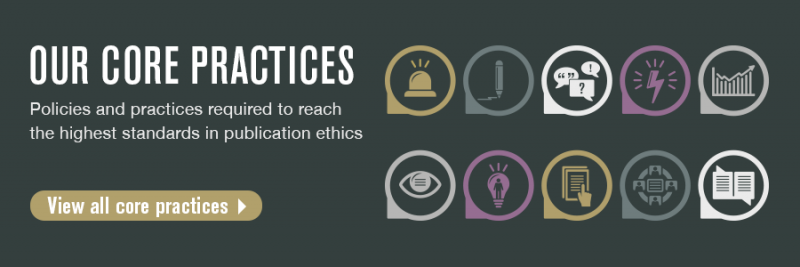Background
A Code of Conduct for Editors has been in place at COPE since 2004, its purpose to provide guidance on current thinking in the practice of publication ethics. Subsequent editions and versions have evolved since their first introduction. Though they have been immensely valuable in guiding how COPE works and supporting how editors, journals and publishers function, they have also been criticised as being overly specific in some areas and not specific enough in others.
What are the Core Practices?
Firstly, COPE has radically simplified the description of its expectations for everyone involved in publishing the scholarly literature, with a particular focus on editors and their journals, publishers, and also institutions.
Secondly, the expectations laid out in the core practices are a framework. Each core practice has links to the detailed documents and resources COPE has already published on its website. These documents and resources will continue to build into a comprehensive and, most importantly, continually revised library. Within COPE’s core practices is a suite of documents including over 500 cases, 20 flowcharts (in multiple languages), 11 guidance documents, and much more.
The ten core practices are:

Why did we do this?
The phrase “Code of Conduct” has been misinterpreted as being quasi legal. COPE is a membership organisation with no statutory or regulatory powers. COPE’s remit is to support and advise editors of scholarly journals and publishers/owners.
The core practices include the core tenets of the Code of Conduct, but have been simplified and better reflect current practice. Additionally, the new framework will make it easier for members and the wider community to find COPE’s continuously updated resources as new issues arise.
The COPE website contains a wealth of information and resources but user feedback tells us that it is difficult to find guidance or advice related to a specific issue. The core practices now groups all resources, including cases, flowcharts, guidelines, presentations, news and events under each topic making those connections automatically.
The Core Practices are relevant to (and expected of) all bodies: Editors, Journals, Publishers, Institutions, etc. (unless otherwise noted) which means just one document and linked resources being maintained to avoid confusion about what applies to whom. Our hope is that COPE is also helpful to the broader academic and publishing community.
How should you implement the Core Practices in your policies and procedures?
Take each core practice individually and think about what that practice means for your discipline or organisation and how best to achieve it
Use the COPE resources to understand how best to create a policy and practice that sets a good standard for your discipline or organisation
Add to your policy documents and put into practice, for example, in your journal guidelines, editorial office software and contracts
The ten core practices will remain the same, but the way we describe them will change over time. For example, data publishing is evolving rapidly and it’s certain to be reflected in our guidance.
What we expect from our members
COPE still expects that high standards are met by our members and the communities we serve. Therefore, in parallel with the launch of the core practices, we have also made changes to our Complaints subcommittee, now renamed the Facilitation and Integrity subcommittee.
The changes clarify that COPE’s role is to facilitate between a complainant and a COPE member where a concern or issue has been raised. However, crucially, the changes in remit of the subcommittee also enable COPE to reach out to our members in cases where they may need guidance which has not been raised to COPE’s attention, either as a complaint or a Forum case. Furthermore, we have implemented a formal sanctions policy which clarifies the expectations we have of our members and allows COPE to further support the ethical standards of those members.
